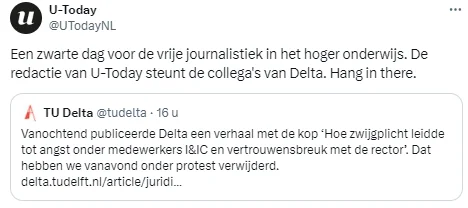After TU Delft ordered Delta to take a critical article about the work culture at I&IC offline, the Executive Board Chair Tim van der Hagen today offered his apologies to Delta on behalf of the Executive Board. At the time of writing, it is not yet certain if the article can be put online again.
The TU Delft campus building where the Executive Board office is located. (Photo: Marjolein van der Veldt)
In the statement, that is published at TU Delft’s website, TU Delft states that both TU Delft itself as well as the lawyer of ‘one of the people named’ in the article ordered Delta to remove the article. This should not have happened, says TU Delft. Whether TU Delft will permit the article to be published again is as yet uncertain.
In the statement, Executive Board Chair Tim van der Hagen says that he understands ‘that this again arouses feelings of disappointment and indignation’. He offers his apologies on behalf of the Executive Board, ‘especially to our colleagues at Delta’. As ‘TU Delft is in the middle of drawing up a plan to improve social safety’, this ‘makes the incident all the more painful’. ‘The Executive Board is aware that yesterday’s events will not help this process. That is why we are apologising now.’
Apart from these statements, Executive Board Chair Tim van der Hagen says that he supports Delta’s independent journalism role. ‘That they follow us critically is not always pleasant, but it is good and necessary. And it should stay that way.’
Removed under protest
The statement was issued after TU Delft yesterday ordered Delta to remove an article entitled ‘How confidentiality led to anxiety among I&IC staff and a loss of confidence in the Rector’. Delta complied with the order under protest.
TU Delft, which employs all Delta’s editors, threatened to make Delta and the Editor in Chief personally liable for any damage incurred. The lawyer of the director named in the article also threatened to charge Delta with libel or slander.
In the piece that Delta published on Monday evening after the relevant article was removed under protest, Editor in Chief Saskia Bonger wrote that removing the article contravenes professional ethics and that Delta still stood behind every word in the piece. Nevertheless, Delta did remove the article. ‘We did this not because we submit to legal intimidation, but because we are of the opinion that TU Delft can use its money and time in better ways than starting legal proceedings against its own employees.’
Online indignation
Since the notice that the article had to be removed was published on Monday evening, social media has been flooded with messages of support. The notice was shared numerous times on LinkedIn. Bonger’s message in particular, in which she talks of ‘a black day for the employees of Delta and for press freedom at TU Delft’, generated a lot of responses.
On X (formerly Twitter, in Dutch), the message has so far been shared nearly 90 times. Accompanied by terms such as ‘censorship’ and ‘press freedom’, outrage and support prevail. On top of this, other higher education media are sharing the news on their websites and national and regional media outlets are covering the events.




Comments are closed.